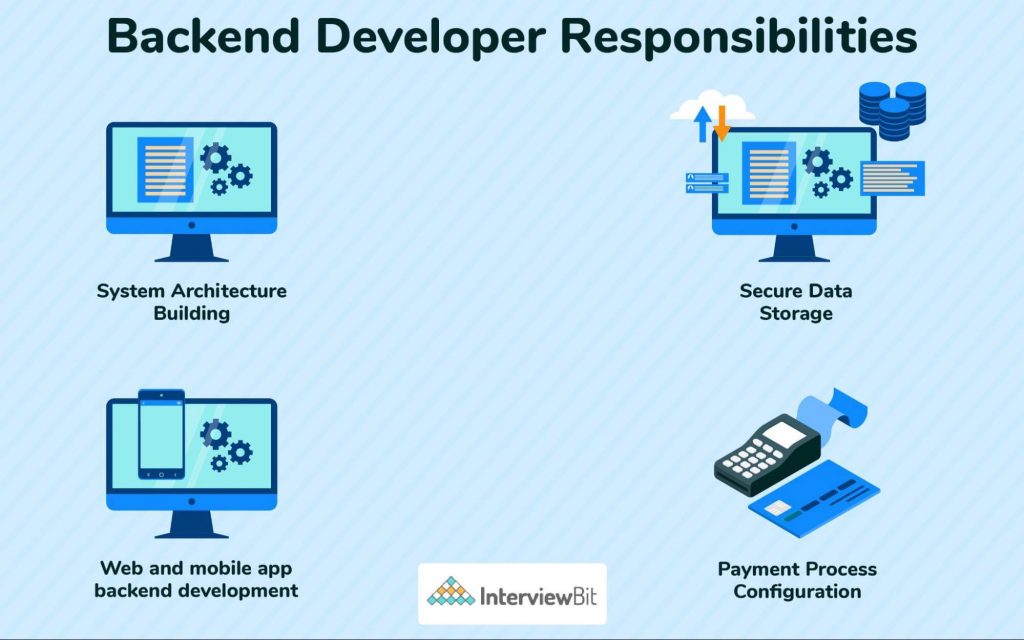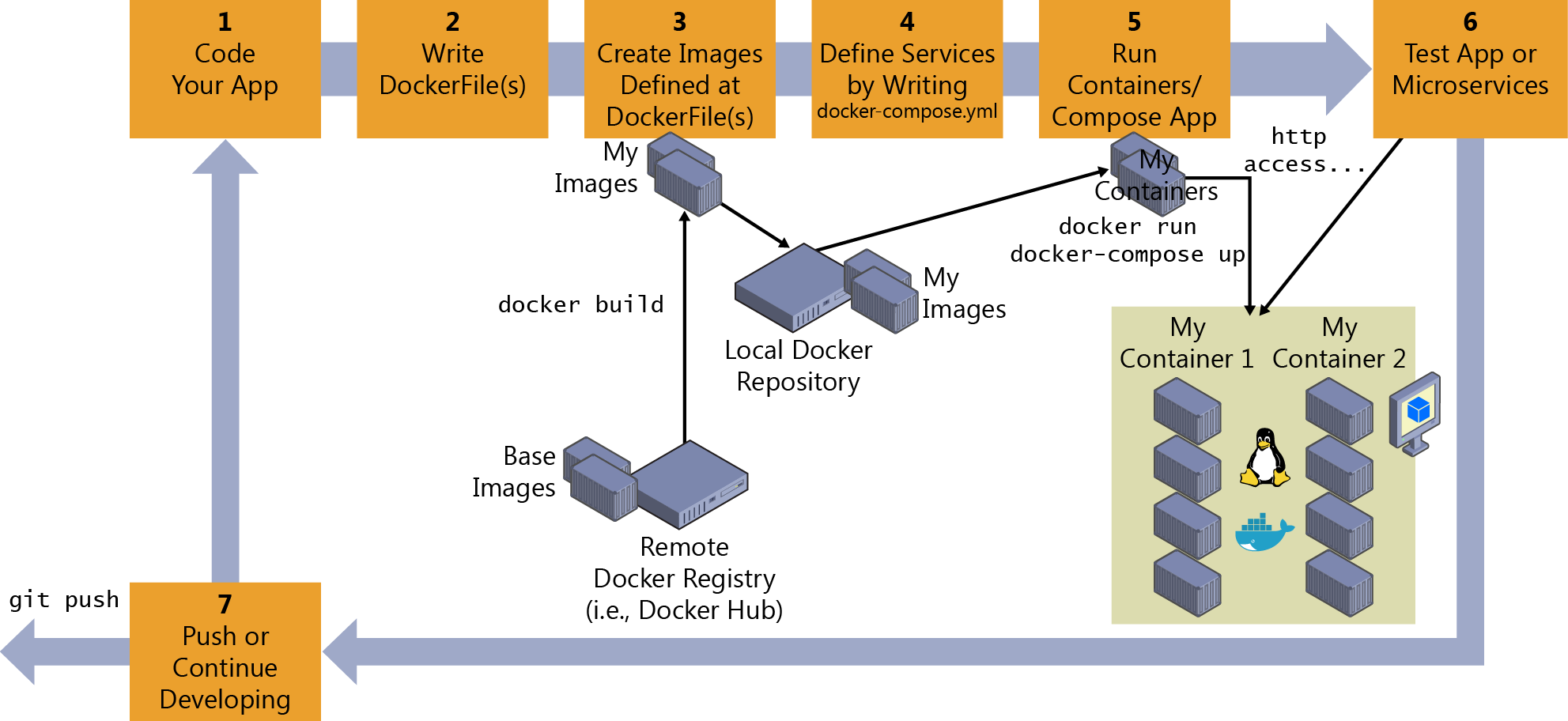Data Management Responsibilities
As a back-end developer, you will be responsible for managing data across the full application lifecycle. This includes designing databases to store user information, setting up server-side APIs to access and modify data, implementing authentication and authorization features to control data access, and writing queries to retrieve and analyze data. Relational database management is a core skill, with MySQL being the most popular option for storing structured data in tables. You’ll also need proficiency with NoSQL databases like MongoDB that are better suited for unstructured data. Proper application of caching strategies using technologies such as Redis and Memcached can boost performance by minimizing direct database interactions.

Building Reliable APIs
APIs provide a standardized way for different software components like mobile apps, websites, and internal services to communicate. As the backend developer, designing RESTful APIs that adhere to best practices will be critical. You’ll leverage popular formats like JSON to transfer data via HTTP requests and responses. Implementing API documentation with Swagger allows other devs to easily understand and consume your endpoints. Additional responsibilities include securing APIs using authentication methods and CORS to restrict access. GraphQL is an alternative data query and manipulation language gaining popularity for its flexibility.
Server Configuration Skills
Deploying and managing application servers that power backend functionality requires fluency in configuration tools. Nginx and Apache are leading web servers capable of routing traffic, serving static files, acting as reverse proxies, and more. Setting up Linux-based virtual machines with tools like Docker and Kubernetes allow separation of concerns through containerization for scalability and portability across environments. Load balancing incoming user requests across multiple server instances maintains responsiveness under heavy loads. Securing servers with SSL/TLS encryption protects the confidentiality of API traffic.
Programming Languages
While front-end developers work primarily in languages like HTML, CSS, and JavaScript, back-end programmers employ a variety of server-side languages. Popular options are PHP for content management systems, Python and Ruby for rapid web application development, and Node.js for real-time functionality. Specific language choice may depend on project needs or company stack. Whichever language you opt for, focus on object-oriented patterns, exploring core libraries and frameworks, and building full-stack applications from the ground up. A strong foundation in one backend language makes picking up others easier over time.
Data Validation and Security
All user-provided data should undergo rigorous validation, sanitization, and escaping on the backend before interfacing with databases or being returned to the client. As an example, when handling user registrations, you may validate the email format and confirm password lengths adhere to policy. SQL injections, cross-site scripting (XSS), and other exploits could allow attackers to compromise systems if validation is lacking. Authentication mechanisms like cryptographic hashing help secure passwords during transport and storage. Role-based access controls restrict sensitive data and actions to authorized users. Understanding web security best practices is paramount for building trusted applications.
Testing and Optimization
Ensuring code quality and reliability requires an emphasis on testing methodologies. Unit tests cover individual pieces of logic while integration tests examine complete functionality across moving parts. Early testing saves significant debugging time compared to hunting issues in production. Optimization never ends as applications grow, so profiling bottlenecks and implementing cache policies that reduce database queries improves performance. On-call responsibilities involve addressing critical issues and deploying solutions seamlessly without interrupting availability or degrading experiences for users.
Documentation and Communication
Technical writing skill is essential for capturing vital project details and ongoing development. Documenting code architecture, APIs, database schemas, deployment processes, and more with services like Read the Docs generates institutional knowledge within teams. Self-documenting code through descriptive function/variable names and comments aids future maintenance. Active communication during all phases, whether planning features, resolving issues collaboratively, or coordinating deployments keeps teams aligned and working toward shared objectives. Leadership also entails mentoring junior engineers and fostering a supportive work culture.
Career Advancement and Learning
Growth depends upon continuous learning as technologies evolve. Expanding skillsets with modern frameworks like Laravel, Django or Express broadens your capabilities to engage various types of projects. Learning a second full-stack language grants opportunity in more diverse positions. Obtaining cloud vendor certifications from AWS, Azure or GCP demonstrates expertise needed for infrastructure-as-code careers. Community involvement through open source contributions and online learning boosts industry profile and resume. Management roles may eventually involve technical leadership, solution architecture duties, staff management and larger budget responsibilities.
The back-end developer role serves as the technical backbone supporting outstanding user experiences and business needs. Combining knowledge across databases, servers, APIs and programming platforms while mastering security, testing and collaboration sets you up for an exciting and rewarding career enabling digital transformation. Ongoing dedication to honing skills and adapting to changes ahead keeps your career progressing in an ever-changing industry. With determination and passion for the craft, infinite possibilities await.

 Current Entry Requirements and Transportation Options for Traveling between Tokyo's Haneda and Narita Airports
Current Entry Requirements and Transportation Options for Traveling between Tokyo's Haneda and Narita Airports